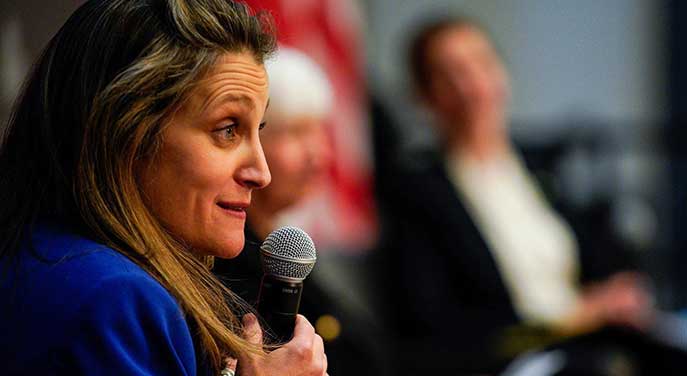 For many people, social media sites offer regular doses of interaction, news coverage, research materials and time wasting. Users often get instant gratification, endless hours of frustration or, in some instances, both.
For many people, social media sites offer regular doses of interaction, news coverage, research materials and time wasting. Users often get instant gratification, endless hours of frustration or, in some instances, both.
One of the many negative aspects of social media – like Facebook, Instagram, Pinterest, Sina Weibo, Snapchat, Twitter, TikTok, YouTube and WhatsApp – is the expectation of an immediate reaction to an event. If something good or bad happens, people race to comment – and expect everyone else to do the same.
Those who are late to the party, or choose not to participate, are usually judged in a petty fashion by social media friends and foes alike.
Case in point: the online reaction to the harassment of Chrystia Freeland.
The Liberal deputy prime minister and finance minister toured several Alberta cities last week. During a visit to Grande Prairie’s city hall, a man entered the building and demanded to speak with her. By coincidence, she happened to be heading to an elevator with her political staff.
In a video posted to TikTok and Twitter, the woman accompanying the man is heard saying, “Oh, right there she is. Elliot, that’s Chrystia.” He then yelled out, “Chrystia!” causing the minister to turn around and greet him. Most people would do the same in that situation.
 |
| Related Stories |
| Free speech doesn’t necessarily mean informed speech
|
| The Trudeau government is on a quest for censorship
|
| Free expression is still under threat with Bill-C11 |
The man then launched into this verbal tirade: “What the f–k are you doing in Alberta? You f–kin’ traitor! You f–in’ b–ch! Get the f–k out of this province!”
This rant was followed by the woman saying, “You don’t belong here.”
When the video went viral, so did the number of reactions from Twitter users. Topics ranged from how this didn’t represent Albertans; “rage” against the man who “verbally assaulted” Freeland; “strong” women being “intimidated” in politics and daily life; another example of a right-wing “crank” and/or “nut job” festering in our society; and whether this episode of her being “yelled” at was worth getting worked up about.
It would be impossible to list the number of positive, negative and neutral online reactions in this column. Or several columns, for that matter.
Within a short period, the left-leaning social media mob began to circle the wagons around prominent and known conservatives. The usual political opponents to Freeland and the Liberals, in other words.
Who has been speaking out against this verbal assault, and who has kept silent?
Virtual checklists were being created by users, and names were being ticked off one by one.
In reality, conservatives spoke out at a fairly steady pace. Federal Conservative Party of Canada leadership candidates like Jean Charest and Scott Aitchison, Ontario Premier Doug Ford and Saskatchewan Premier Scott Moe sent out tweets, among others. Conservative columnists and political commentators did the same, including Lorrie Goldstein, Tasha Kheiriddin, Brian Lilley, Andrew MacDougall and me.
Freeland’s defenders were initially displeased that Pierre Poilievre, the acknowledged frontrunner in the Conservative Party of Canada leadership race, didn’t speak out quickly enough. He had to do it now, in their view, and some didn’t understand why he made everyone wait.
When Poilievre made a statement to CHEK News’s Rob Shaw on Aug. 28 – which was good and covered the main points – very few gave him any credit. They were not only displeased it had taken so long, they didn’t understand why he included himself.
If they had done a little research, they would have figured out why. The man who verbally assaulted Freeland also had an encounter with Poilievre in July. The original video, which was apparently scrubbed from TikTok, was posted here. The incident was confirmed on Twitter by Jenni Byrne, who has a senior role in the campaign.
Putting all of this aside, why was it a race against an imaginary clock to make a comment about Freeland?
Similar to breaking news items, it shouldn’t matter who gets there first. Conservatives who regularly use social media, like Liberals, New Democrats and others, would all tackle this issue eventually. Even if it took a few hours, or a day or two, everyone who wanted to would have their say.
Plus, the way the political left reacted to some recent controversies wasn’t anything to write home about.
Did progressives rush to their computers to blast away at Laith Marouf, who was paid $133,800 by the federal government to teach courses about anti-racism – and turned out to be a racist and anti-Semite?
No.
Did progressives move with lightning speed to demand Liberal parliamentary secretary Chris Bittle apologize or resign for his offensive tweet implying that Prof. Michael Geist’s criticism of Ottawa’s handling of the Marouf controversy was racist?
No.
Should they have in both instances?
If they believe an imaginary clock exists that must always show the correct time for social media reactions, then yes.
Some food for thought the next time you text, tweet or comment about something or at someone.
Michael Taube, a Troy Media syndicated columnist and political commentator, was a speechwriter for former Prime Minister Stephen Harper. He holds a master’s degree in comparative politics from the London School of Economics.
For interview requests, click here.
The opinions expressed by our columnists and contributors are theirs alone and do not inherently or expressly reflect the views of our publication.
© Troy Media
Troy Media is an editorial content provider to media outlets and its own hosted community news outlets across Canada.

